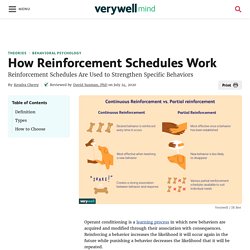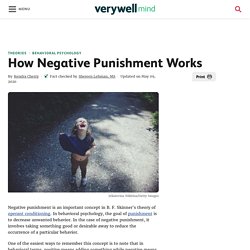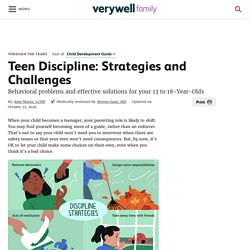

However, operant conditioning is a concept coined by behaviourist B.F. Skinner, derived from psychological experiments. Operant conditioning can be applied to parenting and disciplining behaviour by influencing behaviour using positive or negative reinforcements and/or punishments. (McLeod, 2007). Definition of Operant Conditioning. Watch this video: What is Operant Conditioning? Responses of Operant Conditioning. In a Nutshell. Positive punishment is a popular concept in parenting.

We'll explain what it is and how you can implement it with six examples. Parenting isn't always a walk in the park, and determining the best way to address your child's inevitable poor behavior can be a tricky line to walk. Techniques like positive punishment and negative reinforcement (two parenting "buzzwords" that you've probably heard a lot already) are just two of the ways parents and child care providers can try to correct a child's behavioral issues. [RELATED: "Parenting Styles: 4 Negative Reinforcement Examples "] If you decide to try out either -- or both -- of these parenting techniques, it's important that you first understand what they mean, what they do, and how you can incorporate this technique into your parenting style -- and how your babysitter or nanny can incorporate it into their care repertoire.
For now, we'll focus on the concept of "positive punishment. " What is Reinforcement? What is Positive Reinforcement? Examples of Positive Reinforcement. Teenagers are young adults who are trying to learn the ways of the world.

When they do something great at school or at home or simply make a healthy decision, parents can give them a reward. The reward does not have to be money, but it is a nice way to say "thank you" or "I'm proud of you. " Teens need this positive reinforcement because it shows them that they are on the right track.1 It is also a good life lesson that you can pass on: good things happen to good people. What is Negative Reinforcement? 4 Examples of Negative Reinforcement. What Is a Schedule of Reinforcement? Operant conditioning is a learning process in which new behaviors are acquired and modified through their association with consequences.

Reinforcing a behavior increases the likelihood it will occur again in the future while punishing a behavior decreases the likelihood that it will be repeated. In operant conditioning, schedules of reinforcement are an important component of the learning process. When and how often we reinforce a behavior can have a dramatic impact on the strength and rate of the response.
Schedule of Reinforcement A schedule of reinforcement is basically a rule stating which instances of behavior will be reinforced. Reinforcement schedules take place in both naturally occurring learning situations as well as more structured training situations. What is Punishment? Positive Punishment. What is Positive Punishment? Negative Punishment. How Negative Punishment Works. Negative punishment is an important concept in B.

F. Skinner's theory of operant conditioning. In behavioral psychology, the goal of punishment is to decrease unwanted behavior. In the case of negative punishment, it involves taking something good or desirable away to reduce the occurrence of a particular behavior. One of the easiest ways to remember this concept is to note that in behavioral terms, positive means adding something while negative means taking something away. Examples of Negative Punishment Can you identify examples of negative punishment? After two children get into a fight over who gets to play with a new toy, the mother simply takes the toy away from both children.A teenage girl stays out for an hour past her curfew, so her parents ground her for a week.A third-grade boy yells at another student during class, so his teacher takes away his "good behavior" tokens that can be redeemed for prizes.
Things to Note. Discipline for Teens: Strategies and Challenges. When your child becomes a teenager, your parenting role is likely to shift.

You may find yourself becoming more of a guide, rather than an enforcer. That’s not to say your child won’t need you to intervene when there are safety issues or that your teen won’t need consequences. But, by now, it’s OK to let your child make some choices on their own, even when you think it’s a bad choice. Typical Teen Behavior Teens like to test the limits of their independence.1 So don’t be surprised when your teen argues with you when you say no, or when they go behind your back to do as they please. Adolescence can be a tumultuous time for teens as they change physically, emotionally, and socially. Meanwhile, as friends and romantic relationships grow increasingly important, your teen will want to spend more time with their peers. Your teen also will want more privacy. Although that can be unnerving at times, all of these changes are a normal part of growing up. Common Challenges Remove electronics. Punishments vs. Consequences: Teach Your Teen the Difference.
When I work with parents of teenagers, our conversations inevitably turn toward discipline. “How do get my teen to follow the rules?” “My teen won’t clean up after himself. What should I do?” “Nothing I do seems to have any effect on her!” Discipline with teenagers is complicated. One of the moms at a recent mother-daughter workshop asked me for advice about how to get her daughter to stop being so mean to her little brother. The Difference Between Punishments and Consequences That’s the problem with some favorite go-to punishments—they make the teen suffer for a little while, but they have little impact on changing the behavior. Punishments are used to impose suffering of some kind and to make it clear who is in control. Consequences, on the other hand, are designed to teach teens to learn from their mistakes. What kind of discipline works for teens? The teen years are notoriously challenging for parents.

Much like the toddler years, kids sometimes seem intent on doing exactly the opposite of what we ask. And for some of the same reasons: Their job now is to find their sea legs as a person, to shape an identity, to sort out what's important to them. Their integrity would be compromised by simply doing what we ask because we ask it. They need to believe it's the right thing for THEM. So discipline as we usually think of it backfires with teens. If you have a strong-willed child, you've already learned from your child's rebelliousness that you can't control your child; you can only help him WANT to cooperate, and foster the emotional control that will help him do so.
Of course, if your child hasn't been rebellious, you may have thought you were in control of your child until now. Conclusion. References.